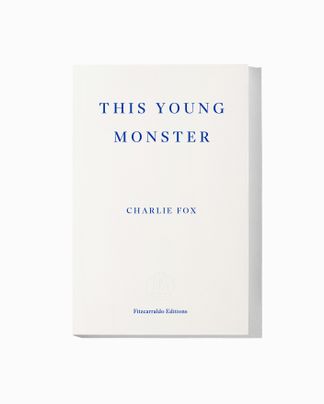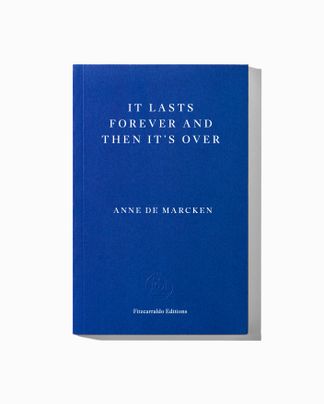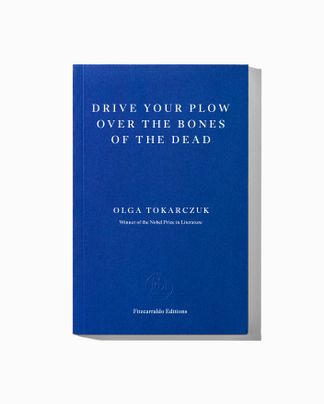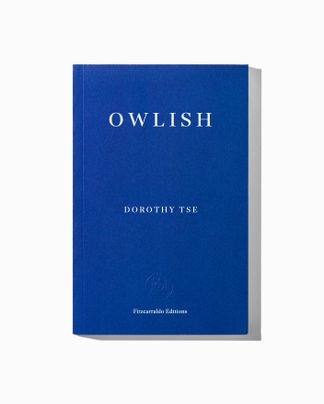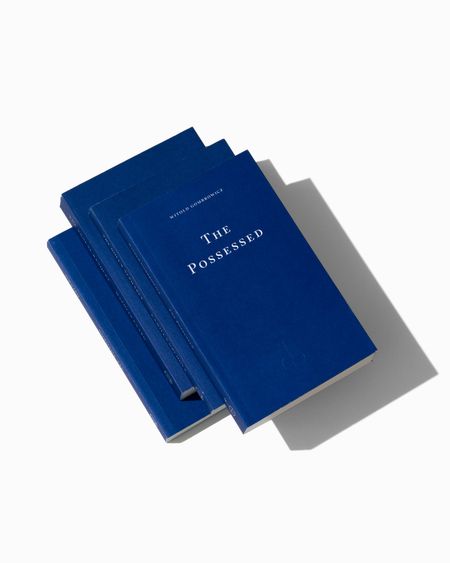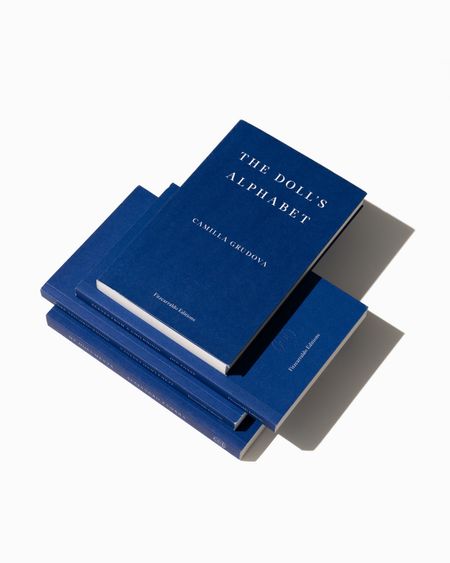Surreal, ambitious and exquisitely conceived, The Doll’s Alphabet is a collection of stories in the tradition of Angela Carter and Margaret Atwood. Dolls, sewing machines, tinned foods, mirrors, malfunctioning bodies – many images recur in stories that are in turn child-like and naive, grotesque and very dark. In ‘Unstitching’, a feminist revolution takes place. In ‘Waxy’, a factory worker fights to keep hold of her Man in a society where it is frowned upon to be Manless. In ‘Agata’s Machine’, two schoolgirls conjure a Pierrot and an angel in a dank attic room. In ‘Notes from a Spider’, a half-man, half-spider finds love in a great European city. By constantly reinventing ways to engage with her obsessions and motifs, Camilla Grudova has come up with a method for storytelling that is highly imaginative, incredibly original, and absolutely discomfiting.
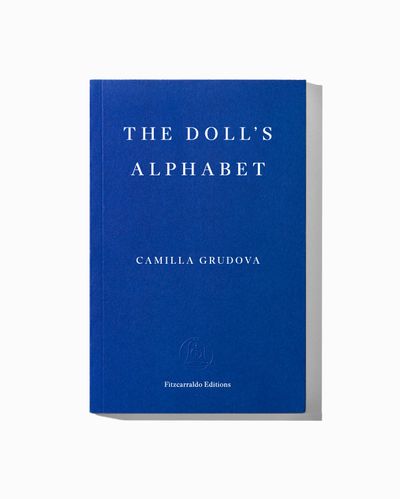
The Doll’s Alphabet
Published 14 February 2017, French paperback with flaps, 192 pages
The Doll’s Alphabet
UNSTITCHING
One afternoon, after finishing a cup of coffee in her living room, Greta discovered how to unstitch herself. Her clothes, skin and hair fell from her like the peeled rind of a fruit, and her true body stepped out. Greta was very clean so she swept her old self away and deposited it in the rubbish bin before even taking notice of her new physiognomy, the difficulty of working her new limbs offering no obstruction to her determination to keep a clean home.
She did not so much resemble a sewing machine as she was the ideal form on which a sewing machine was based. The closest thing she resembled in nature was an ant.
She admired herself in the mirror for a short time then went to see her neighbour Maria, across the hall in her building. When Maria saw Greta, she was not afraid for she suddenly recognized herself. She knew that she looked the same inside, and could also unstitch herself, which she did, unashamed, in front of Greta.
They admired each other, and ate almond cake as they did every afternoon, but now using their newly discovered real mouths, which were framed by steely, sharp black mandibles which felt like a pleasant cross between teeth and a moustache.
When Greta’s husband came home he was horrified. He had never touched her sewing machine before – it frightened him – and he would certainly not touch Greta’s newly discovered body.
She moved across the hall to live with Maria, who was a widow and no longer had a husband to frighten. She brought her sewing machine with her.
Their sewing machines were not used but kept around the house, decoratively, the way they used to keep saint figurines and dolls, and the way grander people kept marble portrait busts of themselves.
They were a sensation the first time they left the building to do their shopping. After seeing other women unstitched, it was impossible not to do it, and soon all the women in their neighbourhood had shed their skins.
It brought great relief to unstitch, like undoing one’s brassiere before bedtime or relieving one’s bladder after a long trip.
Men were divided between those who ‘always knew there was something deceitful about women’ and were therefore satisfied when they were proved right, and those who lamented ‘the loss of the female form’. There was also a small minority of men who tried to unstitch themselves with the aid of razorblades and knives, only to end up wounded and disappointed. They had no ‘true, secret’ selves inside, only what was taught and known.
On the unstitched bodies of women, there were various small hoops, almost like pierced ears, through which a red thread continually flowed, speeding or slowing, depending on the individual’s mood. It was a thick, tough thread covered in a wax-like substance.
On each woman, the hoops were in slightly different places and of various sizes but, otherwise, all the women looked alike.
After the unstitching, sewing machines were no longer used; the act of using one, of stitching things together, was seen as a form of repression, an outdated distraction women used to deny themselves unstitching, and so sewing machines took on a solely formal, aesthetic role, beautiful in their quiet stillness.
Exhibitions of sewing and sewing machines ‘throughout the ages’ were put on and greatly enjoyed, reminding women of their evolution towards unstitching consciousness.
(…)
‘That I cannot say what all these stories are about is a testament to their worth. They have been haunting me for days now. They have their own, highly distinct flavour, and the inevitability of uncomfortable dreams.’
— Nick Lezard, Guardian
‘If fairytales could dream, this nightmarish collection is what you might end up with. Grudova’s closest living counterpart could be Ben Marcus, with whom she shares a heavy debt to Kafka … But the atmosphere of her fantastical, semi-dystopian settings is so unique and persuasive that the day after finishing the book, I awoke from a dream to realize that it had taken place in Grudova’s universe…. The author’s surreal humour, often delivered via deadpan dream logic, recalls the startling short stories of Leonora Carrington. Both Carrington and Grudova excel at a certain well-placed, pedestrian literalism that works deliciously against the magical elements in their fiction.’
— Claire Lowdon, Times Literary Supplement
‘The comic grotesqueries that emerge from this collection owe a bit to Dickens, Kafka and Heinrich Hoffmann’s “Der Struwwelpeter,” but their total effect is delightfully unclassifiable…. The Doll’s Alphabet is clearly a revisionist undertaking. It unsettles assumptions about motherhood and marriage. But it also separates itself from its feminist predecessors. The world it inhabits – droll, inexplicable and even beautiful in its slovenly fashion – is unlike any other I’ve encountered.’
— Sam Sacks, Wall Street Journal
‘This doll’s eye view is a total delight and surveys a world awash with shadowy wit and exquisite collisions of beauty and the grotesque.’
— Helen Oyeyemi, author of Boy, Snow, Bird
‘A remarkable collection akin to a cabinet of infinite curiosities or a hall of mirrors, The Doll’s Alphabet disgusts and delights in equal measure.’
— Dana Hansen, Chicago Review of Books
‘The Doll’s Alphabet … has already garnered comparisons to Angela Carter, Margaret Atwood, Leonora Carrington, Ben Marcus, and Franz Kafka. To this list let me add another name: George Orwell. Not the dystopian Orwell of 1984 or the allegorical Orwell of Animal Farm but the down-and-out, grubby-oilcloth Orwell of The Road to Wigan Pier and Keep the Aspidistra Flying. Grudova does mermaids and magic, but she also does moldy, dingy, scratch-and-sniff interiors that reek of cabbage and old shoes.’
— Christine Smallwood, Harper’s Magazine
‘Imagine a world in which the Brothers Grimm were two exquisite, black-eyed twin sisters in torn stockings and handstitched velvet dresses. Knowing, baroque, perfect, daring, clever, fastidious, Camilla Grudova is Angela Carter’s natural inheritor. Her style is effortlessly spare and wonderfully seductive. Read her! Love her! She is sincerely strange – a glittering literary gem in a landscape awash with paste and glue and artificial settings.’
— Nicola Barker, author of Darkmans
‘[O]ne of the most purely original collections I’ve read, filled with strange and squirmy imagery, monsters and sewing machines and things with many, many legs.’
— Julia Armfield, author of Salt Slow
‘[Grudova’s] stories not only absorb the most fantastic of elements but normalize them, often to deeply troubling effect.… Over the course of The Doll’s Alphabet, Grudova isn’t merely creating a collection of stories. Read as a whole, one feels swept into an entire universe. Elements – including dolls, pregnancy and poverty – repeat and shift between stories, lending a unity to the collection.’
— Robert J. Wiersema, National Post
‘With tight prose and razor sharp wit, Grudova transforms her worlds into something sinister and truly modern.’
— The Edinburgh Book Review
‘Down to its most particular details, The Doll’s Alphabet creates an individual world – a landscape I have never encountered before, which now feels like it was been waiting to be captured, and waiting to captivate, all along.’
— Sheila Heti, author of How Should a Person Be
‘Marvellous. Grudova understands that the best writing has to pull off the hardest aesthetic trick – it has to be both memorable and fleeting.’
— Deborah Levy, author of Hot Milk
‘The worlds created are notable for their variety and consistency: the style is all Grudova’s own, and the prose shows an artfully balanced combination of economy and embellishment that is deeply satisfying to read.’
— Liza Cox, Totally Dublin
‘Beginning with a tale of “unstitching”, the ambitious short stories in The Doll’s Alphabet play out like dreams in which recurring obsessions stitch themselves into the narrative at a bizarre and unsettling cost … Just when we feel we have escaped the familiar for the fantastical, an event or a detail pulls us back. The resulting picture is one of a society determined by structures as opaque and incredulous as our own.’
— Tank Magazine
‘I haven’t read anything as strange or brilliant as this in a long time. I know it won’t be for everybody but it’s very risk taking and it’s easy to write what everybody else writes and that’s not what Camilla Grudova is doing.… We need work like this in the world.’
— Sinead Gleeson, Arena RTE Radio 1
‘One of the most troublingly imaginative, blackly hilarious authors to have emerged in recent times.’
— Buzz Magazine
‘The Doll’s Alphabet is a self-assured, self-possessed, stunning, incomparable debut.’
— 95 books
‘Through language and storytelling that are consistently refreshing and unique, Grudova has created a fascinating, thematically and materially consistent universe…. Each of this book’s stories features plot developments that are entertaining, evocative, witty, and utterly unexpected.’
— Shawn Syms, Quill & Quire
‘[The Doll’s Alphabet] is a meticulously crafted modern gothic, thoughtful in its explorations of femininity and what can survive in darkness.’
— Celia Mattinson, The Riveter
—
An interview with Camilla Grudova in The Culture Trip
The Winnipeg Review interview Camilla Grudova
—
Camilla Grudova lives in Edinburgh. She holds a degree in Art History and German from McGill University, Montreal. Her fiction has appeared in The White Review and Granta.

